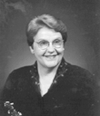 | Charlene Mathis has been a long term care administrator for 14 years, and is currently the Administrator at Villa Maria, Inc. in Mulvane, Kansas. During her years as an administrator Mathis has managed all levels of long term care, including independent living, assisted living, nursing home, and dementia unit. Villa Maria has recently expanded its services and will be opening an assisted living facility, Maria Court, in January. Mathis received her B.A. degree in psychology and sociology from Kansas Wesleyan University in Salina, Kansas and her M.A. degree in community psychology from Wichita State University. Mathis is an active member of the Kansas Chapter of the American College of Health Care Administrators as well as the Kansas Association of Homes and Services for the Aging. You may contact Christine at Villa Maria 777-1129. |
Senior Living
2002-01-01 12:30:00
Nursing home... assisted living... home care
Question: Our mother is 87. She had a stroke three years ago and uses a walker. Lately she has shown several signs of memory impairment. Her doctor agrees. Mother isn't too excited about moving out of her home but she understands. She has the resources to pay for her care. Since memory impairment is a disease that advances, how do we know whether to seek assisted living, nursing home, or memory-impairment care at this point? We do not want her to move again.
Answer: There are several positive aspects of this particular situation. A very interested family is attempting to address their concerns about their mother before they become a crisis and, apparently, your mother is being included in conversation and decision making. The fact that your mother has adequate financial resources may allow for more choices. You have taken a good first step in involving your mother's physician. The fact that her physician supports your concerns gives you reassurance that you are doing the right thing for your mother.You have stated that you do not want her to move again. Perhaps you should not set this goal as a first priority because it may eliminate attractive alternatives for your mother. The placement that will be most successful for your mother is the environment that will provide her the best quality of life for a reasonable period of time, while providing support in the areas needed. It is true that your mother's memory impairment will likely increase as time goes by; however, the rate of progression and the path that it takes varies with each individual. The essential key to a good placement is an accurate assessment of your mother's physical, mental, and emotional status. Think about what she manages satisfactorily and, very specifically, with what does she need assistance. As you talk with admission personnel at prospective facilities, ask questions about the services they provide, specifically how they would meet your mother's needs, how will they address her needs as they increase, what the clientele they serve are like, what would be the expectation of your mother, and what are the boundaries of their program or what are the factors that would make your mother unsuitable for their program. I would encourage you to be very frank about your mother's abilities.Sometimes bad placements are made because families may attempt to "cover" and their family member is placed in a setting where he/she is unable to cope. This is a no-win situation for everyone, and most detrimental to the person being placed.Since your mother is now managing her daily activities in her home with some degree of success and it appears that her memory impairment is in the earlier stages of development, it seems reasonable to explore assisted living as a possible option. The transition from home to assisted living will be the most acceptable for your mother, because she will have an apartment (although usually small) that can be made very attractive with her own familiar furnishings. Many services are available - some included in her monthly base rate and others available at an additional charge. Be sure to point out the positive features of the move (ie. not having to worry about grocery shopping or preparing meals, not having to worry about home maintenance and housekeeping, always having someone available if she needs help, the social interactions with other residents, as well as assistance with all of her specific needs such as bathing, medication administration, etc.).There is a possibility that your mother would need to move to a nursing home if her needs increase to the point that the assisted living residence could no longer safely care for her. However, it is surprising how long residents can remain in assisted living because of the support services available. If the need for a move became necessary, the assisted living staff would provide assistance with placement in a different setting.


